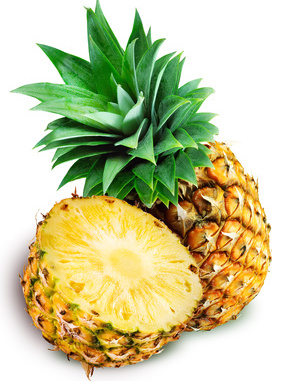
Health Benefits:
Aids in hydration
Anti inflammatory
Combats fatigue
Improves hair skin and nails
Increases stamina
May reduce nausea
May reduce risk of osteoarthistis
Protects against DNA damage
Protects skin from UV rays
Provides energy
Reduces risk of prostate cancer
Nutrition:
Serving size: 1 cup cut; Calories: 82; Fat: .2g; Cholesterol: 0mg; Sodium: 2mg; Carbs: 22g; Fiber: 2g; Sugars: 16g; Protein: .6g; Potassium: 5%DV; Vitamin A: 1%DV; Vitamin C: 131%DV; Calcium: 2%DV; Iron: 2%DV
Did You Know?
- Once harvested, pineapples don't continue to ripen. That means that every single pineapple in the grocery store is as ripe as it will ever be so don't buy one and save it for a week, thinking it will ripen.
- Pineapples contain bromelain which breaks down proteins making pineapple great at tenderizing meat.
- You can treat dry skin with mashed pineapple. Apply mashed pineapple to the affected area and leave for an hour then scrub away the dead skin.
Ways to Eat:
- Raw
- Juiced
- Blended
- Grilled
Farming Trivia:
- You can grow a pineapple plant by twisting the crown off a store bought pineapple, allowing it to dry for 2-3 days, and then planting it
- It takes almost three years for a pineapple to fully mature
- Although the fruit originated in South America, the majority of the world's pineapples now come from Southeast Asia
Note: Always consult a physician for any specific health questions and concerns. Some of this information may be subject to change should there be any new findings from Federal Health Administration (FHA), Food & Drug Administration (FDA), American Medical Association (AMA), American Cancer Society (ACS), and / or other leading food, nutrition and medical advisors.


